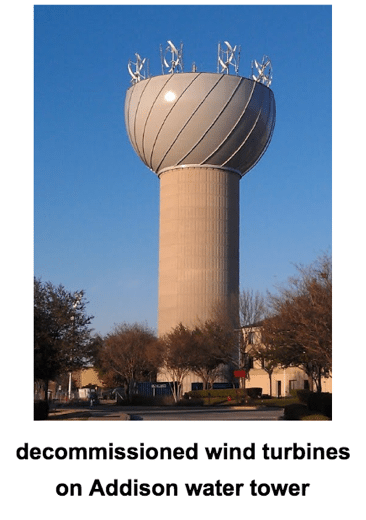
In 2009, Addison leaders dreamed up a $1.1 million project to erect a water tower and place eight wind turbines atop the structure, to show their commitment to the environment, create enough electricity to power the water tower and possibly even street lights. The wind turbines were constructed in February 2012 and just three months later, a turbine crashed to the ground, establishing the first of several challenges with the project. Fast forward to 2018, and the city is suing the construction companies around the faulty project, reported The Dallas Morning News.
The wind turbines, commissioned by the city as a “functional public-works project to double as a work of art,” was brought to fruition by an artist, Freese and Nichols engineers, Urban Green Energy and Landmark Structures.
The problem is that the wind turbine blades kept falling off the tower and the city had to “decommission” the system; now, not one kilowatt of electricity is generated. According to city spokesman Dan Reed, in reference to the wind turbines, “eventually, after the case ends, it will come down.”
The city is citing fraud in their lawsuit against Urban Green Energy and Landmark Structures and suing for $1 million in damages to cover the taxpayers’ loss. According to The Dallas Morning News, the city’s lawyer claims that fraud was involved because promised electrical power never materialized.
However, the city is going to have a difficult time proving fraud for several reasons. First, current and former city employees said in trial depositions, that city officials were lenient toward the contracted companies, even awarding a $100,000 bonus to Landmark for early completion of the project. Former city manager Ron Whitehead, the star witness for the defense, testified in his deposition that he did not see any evidence of fraud and that Landmark fulfilled its obligations “and frankly, we were impressed with how well they responded.”
Secondly, city officials didn’t keep email records related to the project, either. Lastly, the city was unable to uphold its promises related to a $472,000 federal energy conservation grant it received through the North Texas Council of Governments. In the grant application, the city promised, “The project is estimated to generate 68,400-kilowatt hours per year.” This did not happen, reported The Dallas Morning News.
The next step: the trial is scheduled for March 5, 2018.
Published February 6, 2018




Reader Interactions